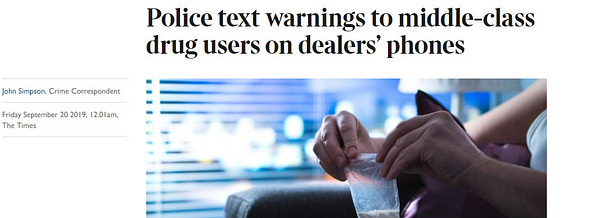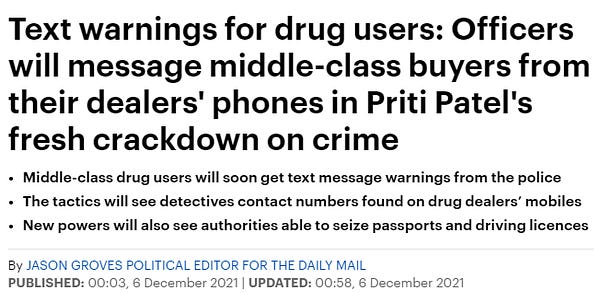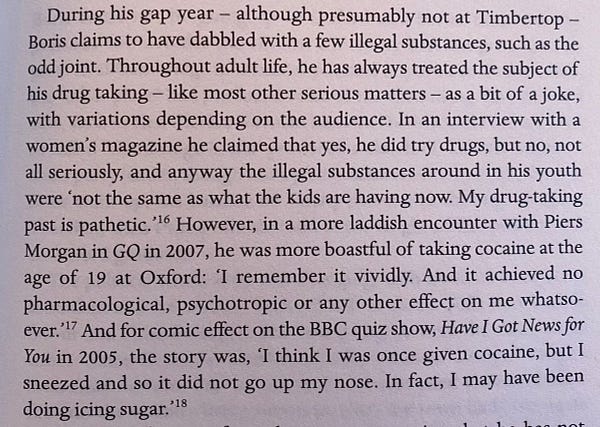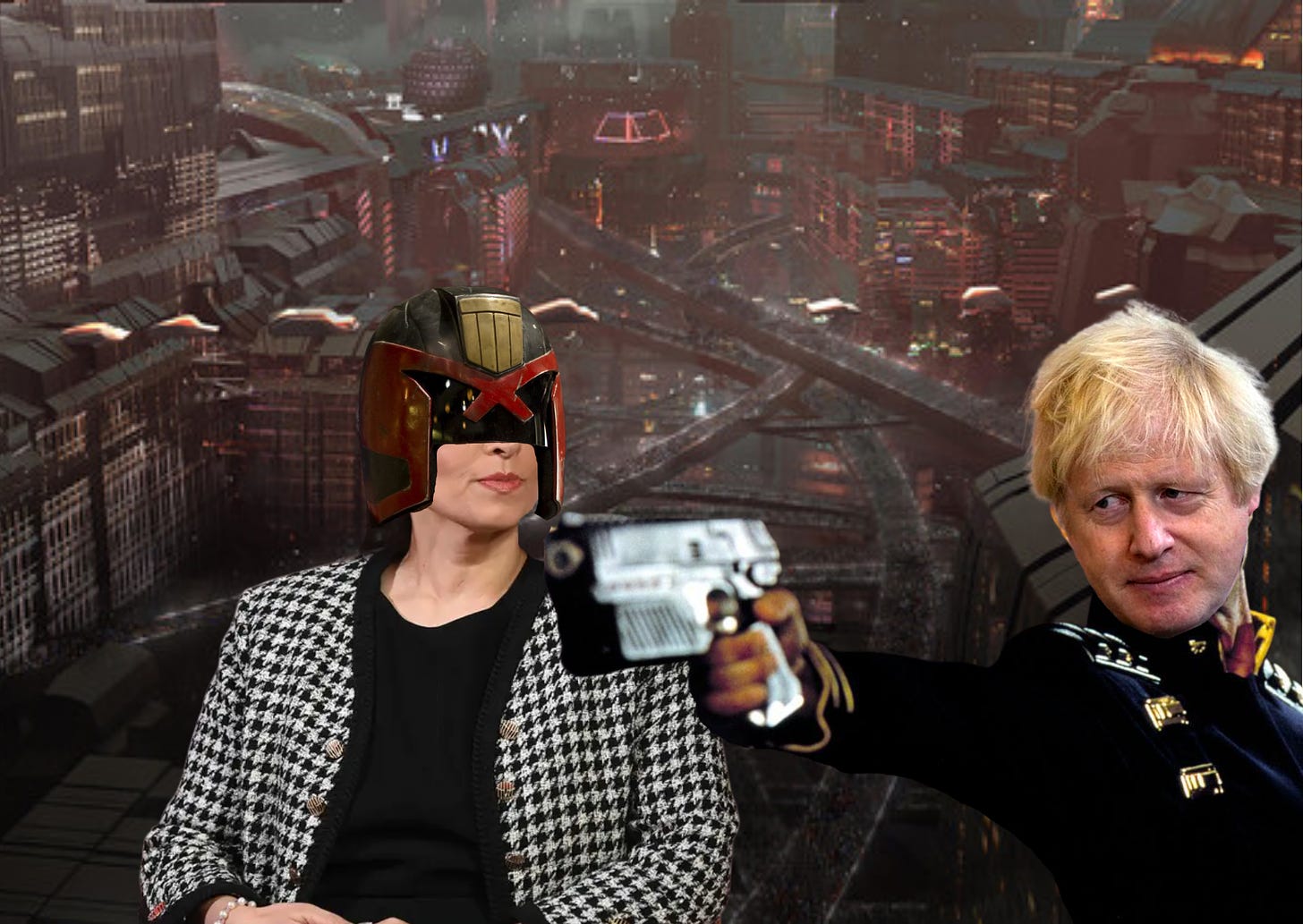Priti obvious threats: The Sun helps Patel to warn her future leadership rivals while The Times kicks off Johnson's new 'war' on judges...
... and the Mail's promised a law change to make up for Meghan.
Today’s edition was written and edited in part on a very wobbly train so please excuse any typos (and let me know what they are so I can fix them). Thank you for being a reader and do consider subscribing or upgrading to a paid subscription if you enjoy the newsletter.
Judge Dredd (1995) is a terrible film but my problem with it at the time — as an 11-year-old 2000AD fan — was not the risible plot, Sylvester Stallone’s mumble-mouthed performance in the titular role, or the contempt it showed for the rich source material. No, my problem was that Dredd was shown — repeatedly — with his helmet off. Judge Dredd does. not. appear. with. his. helmet. off.1
I can forgive my 11-year-old incarnation for being more bothered by trivia and appearances than substance and structural problems. The same cannot be said for the majority of the British media which has a dog-like tendency for detecting tone over substance and a goldfish-style memory.
For the umpteenth time since she became the Home Secretary, Priti Patel has ‘kicked off’ a “crackdown” on drugs, specifically “middle class drug users”. And the press is reporting these announcements as if they are new and novel, rather than rhetoric that’s been reheated more than a Wetherspoon’s meal.
This week’s media blitz to shift the attention onto crime and punishment began with Boris Johnson in The Sun on Sunday. Bylined to the paper’s Assistant Editor (Politics), ex-News of the World political editor David Wooding, and headlined Boris Johnson unleashes all-out war on drugs to clean up Britain’s crime-plagued streets, it opens like a press release…
Boris Johnson will unleash an all-out war on drugs this week in a massive drive to clean up Britain’s crime-plagued streets.
The PM is targeting dealers, addicts and casual users who he believes are the root cause of half of all burglaries and violent robberies.
… with big assertions that are not supported by anything resembling a fact:
He will unveil a ten-year plan to halt the “pernicious” trade by cutting off supply chains and slashing demand.
In the biggest anti-drugs blitz in a generation, he will invest millions in rehab for desperate addicts, coupled with harsher penalties for pushers and recreational buyers.
Wooding does not commit any acts of journalism as he lays out the plans that ‘Boris’ and ‘Priti’ will present this week. Claims like…
Harsh punishments to deter lifestyle drug use, including removal of passports and driving licences, night-time curfews and football-style travel bans.
… and meaningless quotes from Johnson such as…
Most of the crime driven by drugs is generated by 300,000 heroin and crack cocaine users — tragic people who have lost their way in life… but there is a separate group who can cope but who are also feeding the demand and helping to create the economics of the business.
…We are going to look at new ways of penalising them. Things that will actually interfere with their lives so we will look at taking away passports and driving licences.
… aren’t subjected to any analysis or questioning. How will courts decided what is “lifestyle drug use” and what benefit will taking people’s passports or stripping them of their driving licences have?
And, of course, Wooding simply repeats one of Johnson’s previous explanations of his own drug use:
Mr Johnson has previously admitted trying cocaine at university but he said it made him sneeze and had no effect.
As I wrote in July during the Prime Minister’s last big “crackdown on crime”, Johnson has used the “sneeze” line frequently. In a 2007 GQ interview with Piers Morgan, he said:
You once alluded to the fact that you tried cocaine but sneezed on it.
Yes. I tried it at university and I remember it vividly. And it achieved no pharmacological, psychotropical or any other effect on me whatsoever.
Some of it did creep in to your big hooter, then, despite the sneeze?
It must have done, yes, but it didn’t do much for me, I can tell you.
He’d used the line two years earlier during an episode of Have I Got News For You. On that occasion he said:
I think I was once given cocaine, but I sneezed so it did not go up my nose. In fact, I may have been doing icing sugar.
It was a lie wrapped in a joke and Johnson admitted as much in an interview with Janet Street-Porter for Marie Claire in 2008, during his first successful campaign to become London Mayor. At that point, he was trying to present himself as serious and tough so his answer attempted to reflect that:
… that was when I was 19. It all goes to show that sometimes it’s better not to say anything. I thoroughly disagree with drugs.
I don’t want my kids having drugs.
He went on to talk about smoking cannabis at university:
That’s true [I did] but the stuff you and I may have smoked is not the same as what the kids are having now. I think stuff and this stuff is very, very dangerous.
Following the Marie Claire interview the Johnson campaign released a statement in which he raged:
To say that I have taken cocaine is simply untrue. As I have said many times, I was once at university offered a white substance, none of which went up my nose and I have no idea whether it was cocaine or not.
If Johnson were not a white, ex-Etonian, Oxford graduate occupying the office of Prime Minister, I suspect that kind of defence would get very short shrift from the press and the ‘court of public opinion’, let alone Crown Court.



On the same day that Johnson’s “crackdown” interview with Wooding ran in The Sun on Sunday, its sister paper The Sunday Times slapped a story about drug use at Westminster on its front page. Beneath the headline Sniffer dogs could prowl corridors of power amid claims drug abuse is rife, the paper’s Political Editor Caroline Wheeler and Rosamund Urwin, its Media Editor, report:
… many sources have described casual cocaine use by a group of MPs and detection wipes found evidence of the class A drug in 11 out of 12 locations tested in the building, including places accessible only to those with parliamentary passes.
What makes Wheeler and Urwin’s story particularly interesting is the extremely specific map of locations around the Westminster estate where cocaine traces were detected and this quote in particular:
“I have seen an MP openly snorting cocaine at a party,” one source said. “There were journalists present and I warned them that what they were doing was extremely dangerous and they could be exposed but they seemed to get off on the power trip.”
As with the rash of second job stories that followed the Owen Paterson scandal, reporting on drug use at Westminster is one of those things that becomes worth discussion when it suits hacks. The idea that political reporters and editors are shocked about cocaine consumption among MPs and staff in Parliament is about as convincing as Captain Renault’s protestations about gambling.
I’m willing to bet my entire meagre yearly income that a swabbing effort across the offices of News UK — publishers of The Sun, The Times, and Sunday Times — would produce very similar results.

Just as the whips offices of the major parties are known to keep records of the undiscovered indiscretions that help keep MPs in line, plenty of hacks have dirt on politicians and advisors who serve as helpful sources. What causes things to go from nudge nudge wink wink blind items like…
A former MP is alleged to have put his drug dealer on the parliamentary payroll, claiming that the man was a member of his staff as a way of paying him for the drugs.
… to actual stories that name names and take reputations is a mixture of a) the evidence to stand them up b) an expedient reason for making them public, c) the value of that person as a source and d) the likelihood that another paper will splash the story first.
The statement from Priti Patel in The Sunday Times piece…
[There is] no place in our society for drugs and certainly not in our parliament. Those who have the privilege to work at the heart of our democracy who are involved in drug use or distribution are utterly divorced from the heartless pain and suffering of the drug trade they are fuelling.
… serves as a slab of populist “tough on crime” rhetoric, a warning to Tory MPs she’ll need to get to line up behind her in the eventual leadership contest and… um… nosey rivals who might stand against her, and a pitch-rolling exercise for the legislation to come.
Alongside the news report, the paper ran an anonymous piece from a “special adviser”, which, as another journalist put it to me “sounded exactly like it had been penned by a 60-year-old with no experience of recreational drugs writing about what they think 20-somethings taking drugs might be like”. Headlined ‘It’s common to see messed-up people wandering the halls’, the piece said:
It’s talked about pretty openly in the tea rooms of parliament. “So and so takes coke” or “they like MDMA”. Sometimes you pass it off as backbiting but sometimes it’s signposting where to get whatever upper or downer you require. I remember chat that one staffer snorted cocaine off their boss’s parliamentary desk. In any other world that would be a sackable offence but here is just met with a shrug.
So what’s stopping hacks reporting on all this debauchery until the week that the government claims yet again that it’s about to “crackdown on middle class drug users”? A cynical person — that’s me! — would find the timing suspect.


The same edition of The Sunday Times included a good example of how news stories are written selectively. In its story on the suspension of one of Angela Rayner’s advisors — Jack McKenna — Wheeler and Gabriel Pogrund, The Sunday Times’ Whitehall Correspondent, wrote:
It is understood McKenna’s suspension is linked to a now-deleted tweet by a journalist. It referred to a row between Ian Murray, the shadow Scotland Secretary, and Labour’s head of policy, Claire Ainsley…
Who was this mysterious A. Journalist that the report referred to? None other than Eleni Courea, a political reporter at The Times.
Having floated the policy announcements in The Sun and put the frighteners on wayward MPs in The Sunday Times, Priti Patel appeared in The Daily Mail today, contributing an op-ed headlined I won’t stand by while evil criminal drug gangs exploit our children, and coming off like the provisional wing of the Helen Lovejoy fan club dialling in from a reality entirely of her own construction:
The criminal drug trade is run by dangerous people whose evil has no limits. They have for years exploited and abused vulnerable children to peddle their substances and enslave them into their deadly networks. Children as young as seven are being used to deliver drugs by these sickening gangs.
As Home Secretary, I will not stand by while such dehumanising exploitation and criminality takes places.
That is why this government is putting more police on the streets, with over 11,000 more officers already out in communities across the country.
They are better funded, trained with the tools and resources needed to crackdown on drugs and these gangs to make our communities safer.
And our approach is working – there has been a 14 per cent fall in overall crime, excluding fraud and computer misuse, in the last two years.
Even if you buy into the idea that there’s any scenario where a war on drugs doesn’t end with a decisive win for drugs and that increasing police numbers is the solution, Patel’s claims are provably horse shit.
Between 2010, when the Coalition government took office, and March 2019, police numbers in England and Wales fell by over 21,000 . Even with the 11,000 recruits that Patel claims — and that figure is, like any statistic offered by a British government, up for debate — there are still roughly 10,000 fewer officers than when the Tories returned to government.
It’s no surprise that these claims aren’t scrutinised by The Daily Mail, which is obviously delighted to have the Home Secretary doing her tough talk in its pages. That probably explains why the accompanying news story from Jason Groves, the paper’s Political Editor, opens by trumpeting that:
Middle-class drug users will get text message warnings from the police as part of a crackdown on crime to be unveiled today.
The new tactics will see detectives directly contact the phones of users whose numbers are found on drug dealers’ mobiles.
Additional powers will also be introduced to allow the authorities to seize passports and driving licences from middle-class users whose habits fuel the trade.
Only the ‘new tactics’ aren’t remotely ‘new’. In May 2020, Groves’ colleague, Daily Mail senior reporter, Dan Sale, wrote an ‘exclusive’ on “police [targeting] middle class and weekend cocaine users who 'dial for drugs'”, reporting that Thames Valley Police and Nottinghamshire Police forces had used the tactic.
Over at The Times, Matt Dathan, whose role as the paper’s Home Affairs editor often boils down to playing stenographer for the Home Office, shares the contents of the same briefing as Groves got, writing that:
Penalties being considered include confiscating passports, driving licences and larger fines to deter recreational users.
This is a familiar trick from the Johnson administration and one that reporters like Dathan often collude with. If you say something is “being considered”, it’s possible to easily weasel out of it when it turns out it’s not as popular as you thought or is entirely logistically or legally impossible.
Dathan doesn’t analyse the proposals and the only non-government quote in the piece comes from Yvette Cooper — recently brought back into the shadow cabinet as Shadow Home Secretary — who says “any action from the government must be substantial enough to undo the damage they have caused.”
Actual critics of the government’s policies — of which there are many — do not get a look in and even Cooper’s quote comes in the last quarter of the story where many readers in print and online will not read it.

Both Groves and Dathan do not mention in their stories that both Patel and Johnson have made a big noise about “targeting middle class drug users” multiple times, most recently in October when the Home Secretary said that middle class drug users would be “named and shamed”, reaching back into the early-00s for a phrase most heavily promoted by then-News of the World editor, now News UK CEO Rebekah Brooks.
Two months before the government promised an ad campaign to “target middle class drug users” — which has yet to appear — and The Times ran another piece from another anonymous middle class drug user. Where does it find them? After all, if we swabbed the toilet stalls of News UK’s HQ they’d be entirely powder free, right?
Go even further back and you’ll find the “middle class crackdown” featuring in pieces from March 2021 (where the promise of that ad campaign began), January 2020 (where the focus was on so-called “‘woke’ drug dealers”). Back in September 2019, the papers were reporting on police texting warnings to those same “middle class drug users”, in pieces that they have now seemingly entirely forgotten about.
And in 2018, while Theresa May was still in Number 10, the newspapers were delighted with then-Justice Secretary David Gauke castigating dinner party coke users for “fuelling stabbings”. And back and back it goes, presumably until you reach some 18th century scandal sheet decrying the narcotic interest of coffee house louts.
Beyond the reheated “war on drugs” stuff — accepted by the papers like a buffer of fresh, piping hot new policy — the government had other legally dubious proposals to float in today’s morning editions. On the front page of The Times, fascist conspiracy theory peddler and no stranger to court rooms, Tom Newton-Dunn, and the paper’s Legal Editor, Jonathan Ames reported that Boris Johnson plans to let ministers throw out legal rulings, on the basis of government briefings, indicated by that classic weasel phrase “The Times has learnt”.
There are, of course, no horrible historical precedents connected to government’s trying to rip the judiciary’s teeth out at the root. That’s probably why Newton-Dunn and Ames stuffed critical quotes from Gauke and Good Law Project director Jolyon Maugham QC at the end of the report with a note that the Ministry of Justice declined to comment. Why would it need to comment when it had done all that anonymous briefing? I will come back to this topic in a later newsletter.
I’ll also dedicate an entire newsletter to another briefing today that the government intends to “correct the balance between freedom of speech and privacy”, following comments by Dominic Raab to Newton-Dunn on Times Radio yesterday that:
I think the drift towards continental-style privacy laws, innovated in the courtroom, not by elected lawmakers in the House of Commons, is something that we can and should correct.
As I outlined in an edition last week, changes in UK laws around privacy are not as a result of some continental plot, but the actions of the very tabloids that are howling about them now. The timing of this new line from the government is as blatant as the arse-kissing coverage of Prince William in the weekend’s papers.
The Johnson government wants to restore and solidify its support in the Murdoch and Rothermere papers and it knows that defanging privacy law following the Duchess of Sussex’s defeat of the Mail on Sunday will be very popular with them. The right-wing press are no particular fans of the judiciary — remember the Mail’s Enemies of the People headline? — and if Boris Johnson can deliver an easier life for the papers they’ll row in behind his desire to stop jumped up judges from getting in his way.
And while all of this is going on, a swathe of the centre, centre-left and terminally melty types are obsessing over Downing Street Christmas parties last year. They are annoyed that Dredd took his helmet off, not that the whole story is broken.
Actually, it’s more complicated than that but then, isn’t everything? Dredd does take off his helmet on a few occasions but his face tends to be obscured. And yes, fellow nerds, you could argue that since Judge Fargo, from whom Dredd was cloned, has been shown then we have effectively seen Joe’s mug.




